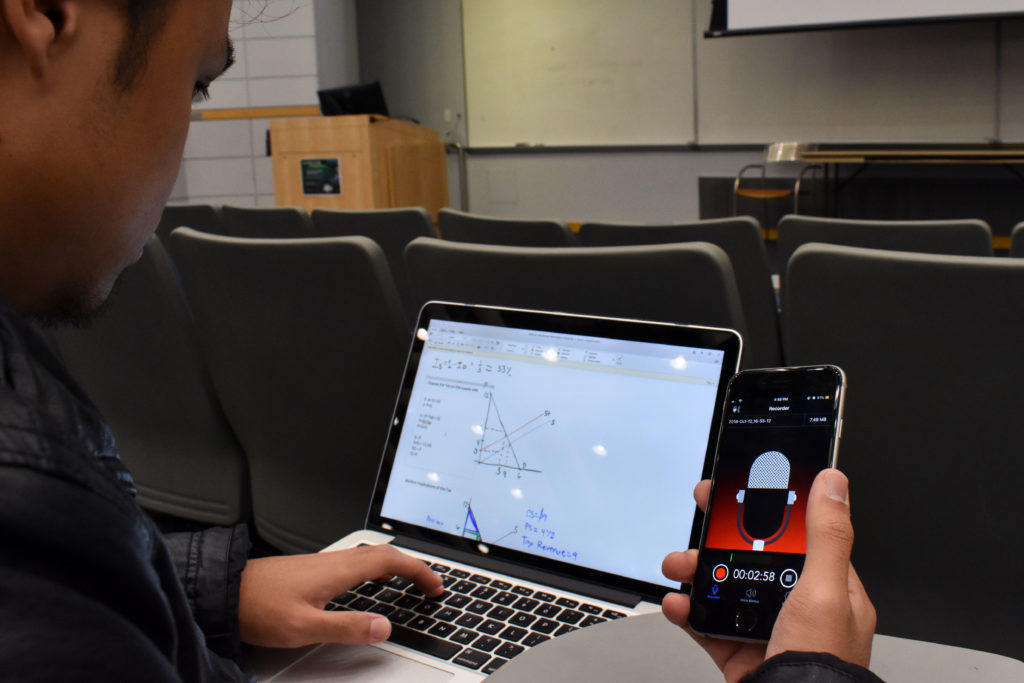Faculty are backing new language in the student code of conduct specifically prohibiting unauthorized student recordings in the classroom.
Officials announced earlier this month they would update the student code of conduct to include a policy prohibiting video and audio recording in the classroom without permission from the professor. In more than 20 interviews, faculty members said the policy makes a formerly unspoken rule clear and reinforces the importance of open communication and trust between faculty and students.
The previous code, which had not been updated in more than 20 years, didn’t explicitly state that unauthorized recordings are considered “prohibited acts.” Faculty members said unauthorized student recordings in the classroom can be used to expose a faculty member’s political bias, which can portray faculty members’ lectures out of context.
Tyler Anbinder, a professor of history, said he prohibits his students from recording during his lectures unless they require disability accommodations or inquire beforehand. He said when students don’t rely on recordings, it improves their note-taking skills and ensures they attend class.
“I think it’s a good idea that everyone is clear on what the rule is and what the expectations are,” he said. “I find that most faculty members are reasonable.”
Anbinder said professors may oppose unauthorized recordings in the classroom because the recordings can potentially capture intellectual property from lectures, which could be stolen if the recording was posted publicly. He added that recordings of lectures could also be edited or show a faculty member’s actions out of context.
“I don’t think that, in a setting where you’re supposed to be having the free exchange of ideas, that it’s a good idea to let students record and then they can cherry-pick things that might have come in a different context,” he said.
At least six of GW’s peer schools, including the University of Pittsburgh and the University of Miami, have similar policies prohibiting classroom recordings without consent.
Henry Nau, a professor of political science and international affairs, said students’ decisions to record faculty without their consent is disrespectful and infringes on professors’ individual rights.
“A faculty member should consent, no less than the student should consent to something being recorded,” Nau said. “Otherwise, we’re moving into the world of espionage, and good lord, that has no place whatsoever in the classroom.”
He said that in some instances, especially in a polarized political climate, students may wish to expose a professor’s alleged political bias in the classroom through unauthorized recordings. He said that if students are unhappy with the perceived bias of their professors, they should engage in direct discussions with the faculty member in question.
“Shouldn’t everything be open in the classroom?” he said. “The classroom is not a courtroom, it’s not a Senate hearing – it’s a forum where we try to develop critical thinking, so we should always be open in that environment.”
Several students posted recordings of their professors online to expose perceived political biases after the 2016 presidential election, making national headlines. In one instance, a student recorded a video of a professor’s anti-Trump comments during class at Orange Coast College in California, leading the school’s chapter of the College Republicans to call for administrative action against her.
Gelaye Debebe, an associate professor of organizational sciences, said she supports the update to the code because the new language ensures there is consent and trust between faculty and students. She said it’s important students understand the word “unauthorized.”
She said she supports the policy because “it gives faculty the power to say yes or no, which they should have that power to say ‘yes, record it’ or ‘no, don’t record.’”
“I don’t see any reason why a student would want to withhold informational knowledge from the professor if they need to record a lecture,” she said. “If they feel like they need to withhold it, that right there begins this relationship that’s not based on transparency and openness.”
Robert Stoker, a professor of political science, said he has always assumed that students would ask permission to record his lectures “as a matter of courtesy.”
“One of the things that I strive to do as an instructor is to make a lot of resources available to students, primarily through the Blackboard,” he said. “If someone wanted to record a class, I have been asked in the past and I have not objected.”





